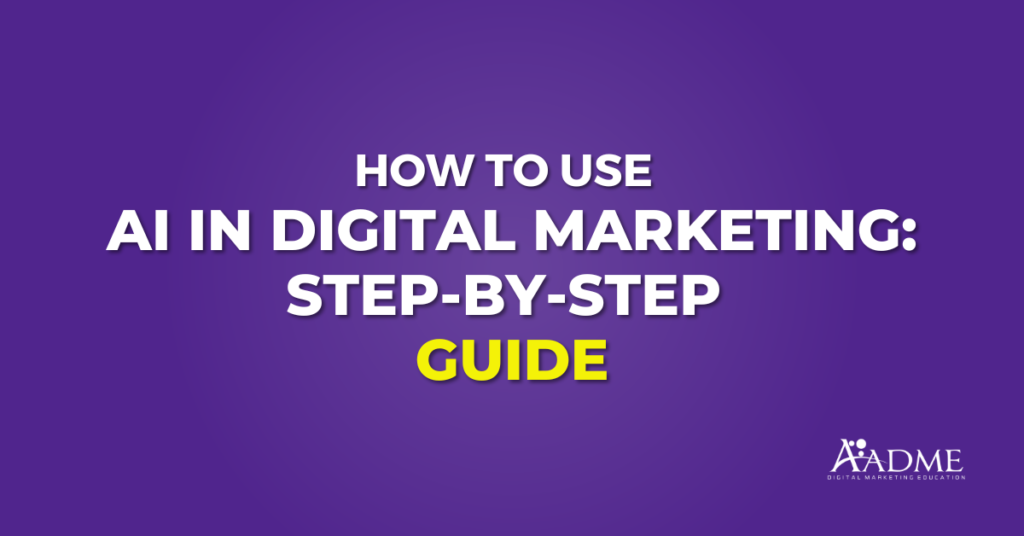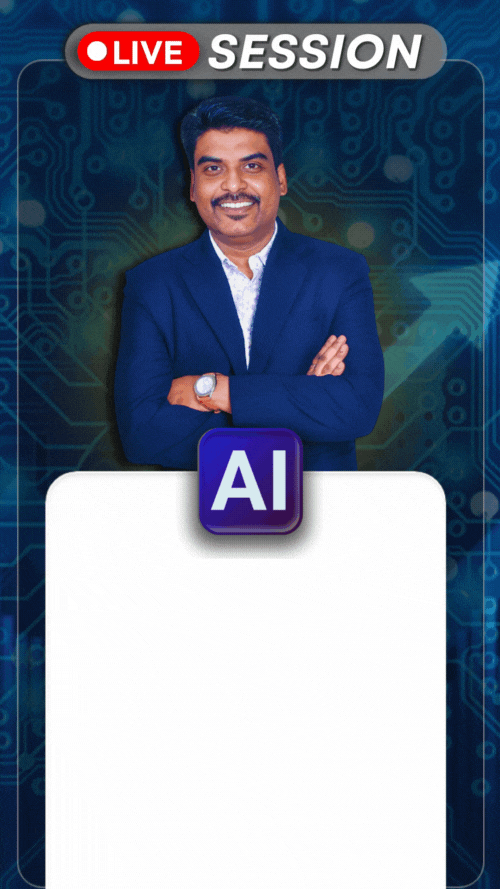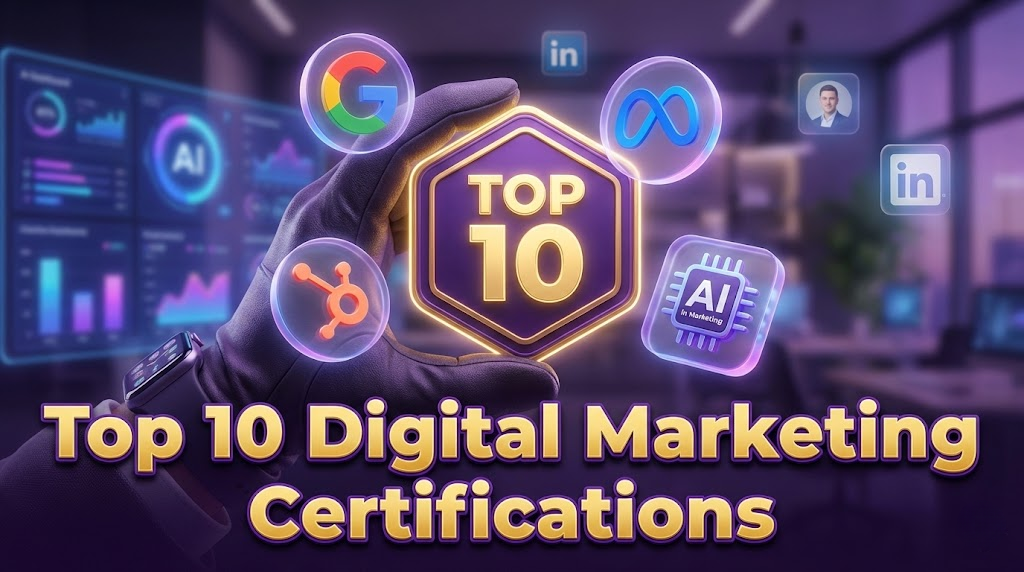Have you noticed how rapidly digital marketing is changing?
It was always like that, and now with AI, digital marketing is reaching new levels. Every month, new tools are added to digital marketing with an AI library from personalized ads to chatbots.
Artificial Intelligence (AI) is causing some of the most exciting innovations in the digital marketing world.

If you’re a marketer, business owner, or just curious about how AI is used in digital marketing and how it can be useful for your business strategy, you’re in the right place!
In this guide, we will explain how AI is used in digital marketing, from automating repetitive tasks to providing customer insights.
By the end, you’ll have a solid understanding of how AI can take your marketing efforts to the next level—and, most importantly, how to use AI in digital marketing.
Read More: What is Digital Marketing? Types, Examples, Funnels & Benefits
Table of Contents
ToggleWhat is AI in Digital Marketing?
Let’s start with the basics: What is AI in digital marketing?
AI, or Artificial Intelligence, is a machine learning technology that can work similarly to human intelligence for repetitive tasks.
It helps automate many tasks, predict various outcomes of your business, and analyze retention (feedback) data—things that would normally take a lot of time if done manually.
In digital marketing, AI is used to increase productivity, personalize the user experience, and provide feedback around that data, which helps digital marketers make proper decisions. This means everyone has to do less guesswork and be more authentic.
For example, when you see product recommendations on Amazon or personalized or suggestive playlists on Spotify, that’s AI integration on those platforms.
It’s constantly learning from the platform data and improving its recommendations according to your interests and behaviour.
Now, Imagine applying this AI to digital marketing, which helps marketers make better and more precise campaigns for their business based on the actual data coming from customer feedback or behaviour.
Read More: 6 Powerful Tips on How to Create a Digital Marketing Portfolio
AI’s Core Functions and AI Benefits in Digital Marketing
AI in digital marketing has four core functions that benefit the most:
- Data Collection and Analysis:
AI in digital marketing is used to collect user data based on various things like location, interest, age, group, region, and many more. This data is used and analyzed to identify trends, create sets or groups of audiences, and provide insights into products or platforms.
- Automation:
AI automation tools help digital marketers manage tasks and make them automate the work or different tasks. It helps the business save time and maintain consistency throughout the whole process, even if someone is not available at the very moment.
- Personalization:
AI in digital marketing helps businesses or digital marketers create targeted campaigns, ads and even offers to deliver the right message to the right person at the right time. It’s always feedback data-based.
- Predict Analytics:
AI helps predict future outcomes by analyzing old and new data coming from the platform. It covers everything in it, from ad campaigns to product recommendations. These analytics help with personalization based on user intent and interest.
Read More: How to Start a Career in Digital Marketing: A Beginner’s Guide

Advanced✨A.I. Enabled Performance Marketing & Business Mentorship Program
Please fill up the form below to book your free trial class today
Key Applications of AI in Digital Marketing
AI can do a lot of work in digital marketing, and in this guide, we have mentioned a few ways to show how to use AI in digital marketing. We also mentioned examples of each use so that you can see that AI is being used in digital marketing in real time.
Here are the uses of AI in digital marketing:
AI in Automation
AI is a game-changer when it comes to automation. Many businesses use AI to automate tasks like sending emails based on user groups and collecting their feedback and responses, managing social media, running ad campaigns, and even responding directly through website chatbots.
The goal is to use automation in any kind of business with the help of AI to save time and resources while maintaining the same amount of work as before.
Example: Chatbots and AI-driven email marketing platforms like MailChimp or Hubspot.
Chatbots use AI to respond to customer inquiries in real time, providing instant support without needing a human operator.
They are used on many e-commerce or other product or service provider websites to assist customers with their queries to find products or answer frequently asked questions.
Tools for chatbots: Drift and ManyChat
Tools for email marketing automation: Mailchimp and Hubspot
AI in Content Creation
Creating engaging, relevant content is one of the biggest challenges for marketers. But don’t worry; AI can even help with content creation.
It can help generate blog posts for websites, social media content, and video scripts for short and long-form videos in just a few minutes.
AI in content creation is used to analyze internet data based on your kind of business and make relevant posts, outlines, and even content calendars to increase its reach.
It can generate platform-specific data as well if that’s the requirement for content.
Tools: Tools like ChatGPT, Jasper AI, and Copy AI are used to generate blog posts, social media content, email subject lines, titles, and descriptions with scripts for video content. All these kinds of tools help digital marketers use AI for their businesses. It’s more of a leverage.

For example: Consider any celebrity news media website or informative websites using AI to generate headlines, summaries of an event, or even entire articles based on recent trends and topics.
By doing that, they can leverage AI in content creation to increase their publishing speed without compromising the quality of the website. They can create fresh and up-to-date content.
Don’t worry—AI isn’t here to replace human creativity; instead, it is here to help create more content faster and personalize it.
AI for Customer Insights
One of the most important and powerful uses of AI in digital marketing is its ability to process huge amounts of data and later use that data to generate insights about customer behaviour.
AI in digital marketing can predict trends and what will work for your business in the future as well, on the old data collected or presented on your platform.
Insights help businesses understand their audience’s behaviour and how to target them better using the other AI tools I mentioned above for automation.
Example – Tools like HubSpot and Google Analytics with AI integration can track user behaviour, identify trends, and help digital marketers know what their customers are likely to do next.

This helps them create a real-time strategy and make more informed decisions. Facebook and Instagram provide insights into their platforms to use for your business and to know about audience behaviour.
Insight Tools with AI Integration for digital marketing: Google Analytics, Salesforce Einstein, and HubSpot’s AI-powered tools.
AI in SEO Optimization
If we see the trends, Google in today’s time is using AI to rank content. And as a business leader or a digital marketer, we have to use AI-powered tools to optimize content for keywords and SEO.
These AI tools help digital marketers make sure that their content is relevant to their existing and upcoming audiences, that it is high and rich in quality, and that is near what people are already searching for on the internet.
Example: Tools like Clearscope and Surfer SEO are used in today’s time to optimize content for low-competitive keywords, which helps the content rank in a better position on search engines like Google.

They suggest relevant and low-competitive keywords, as well as content length and structure. Basically, everything that matters in ranking an article or piece of content on a platform.
Read More: 5 Best Online Digital Marketing Courses in India

Advanced✨A.I. Enabled Performance Marketing & Business Mentorship Program
Please fill up the form below to book your free trial class today
AI Tools Every Digital Marketer Should Know
To take full advantage of AI in digital marketing, it’s good to know which tools and types are right for the job. Here are some of the top AI-driven tools for digital marketing:
Chatbots:
Tools: Drift, ManyChat, Intercom
Use: Automate Customer Interactions based on frequently asked questions, provide support for any type of query, and guide users about the customer journey, the products, and their uses. Automating customer interactions and support.
Content Creation Tools:
Tools: ChatGPT, Jasper AI, Copy.ai
Use: Generate Content ideas and blog post outlines; write social media posts; create full blog posts; write product descriptions and video scripts.
AI-Based Advertising Platforms:
Tools: Google Ads, Facebook Ads
Use: Optimize ad targeting using AI. Ads targeted include audience region, age group, occupation, study, and locations. It helps all types of businesses increase their reach through managed ads.
Analytics Tools:
Tools: HubSpot, Google Analytics AI, IBM Watson

Use: Track customer behavior on the website, including the customer journey and email campaign. Provide insights about that data, which eventually helps businesses make informed and data-driven decisions.
How to Implement AI in Your Digital Marketing Strategy
Ready to implement AI with your digital marketing strategy? Here are some steps to get started:
- Identify:
Start identifying your old digital marketing strategy and see if there is any type of scope to add more value with the use of AI; look out for tasks that can be automated, and see if you can increase your speed of content creation with the use of AI, and see if your analytics have allowed for the integration of AI tools.
- Choose the Right Tools:
Select AI tools for digital marketing that align with your specific needs and with the problems you identified. There are many tools for each type of task; search for which one would be best for your business.
- Start Small:
Don’t rush things or implement all AI tools at once. Try to implement AI tools gradually in a small part of the process to see if that works well. For example, try automating a single task or using AI-powered analytics for a smaller task.
- Measure Success:
Measure the impact of those AI tools on the small tasks you implemented. You can measure conversion rates, engagement, and return on investment (ROI) on these tools. If everything goes well, you can also start implementing it for other tasks.
Digital marketing course that teaches AI integration in Digital Marketing
Unfortunately, at AADME, we offer a digital marketing course with over 80+ AI tools integrated into digital marketing that covers all types of systems that can be automated and personalized as well as how you can make a better advertising campaign for your business or your company.
We not only teach AI integration in digital marketing within this course, but we also offer to teach how you can start your career as a digital marketer in the future, work like a freelancer, and improve your present digital marketing skills.

If you’re interested in knowing more about our Digital Marketing Course with AI tools integration.
You can check the course details here: 4.5 Months Digital Marketing Course with AI tools Training
Feel free to contact us here:

Advanced✨A.I. Enabled Performance Marketing & Business Mentorship Program
Please fill up the form below to book your free trial class today
Case Studies: AI Success Stories in Digital Marketing
Here are some case studies of digital marketing with AI, showcasing some of the leading brands that are successfully using AI in their digital marketing strategies.
- Amazon
Amazon is a leading e-commerce business that has also been a leader in using AI to personalize the customer experience. AI helps Amazon identify customers’ needs by analyzing user data, which eventually helps in product recommendations and helps filter products based on price. All these help Amazon achieve higher sales and be one of the best customer-satisfied websites.
- Spotify
Spotify’s AI algorithm creates personalized playlists, such as Discover Weekly, that help music producers offer their content to new users and help users get new recommendations according to their listening habits. It helps Spotify increase the time users spend on their platform and build their loyalty. It also increased their engagement.
- Sephora
Sephora is a global beauty product retailer that has leveraged AI to know about their customer experience more uniquely. Their new AI-powered addition is “Sephora Virtual Artist.”, It’s a kind of AR tool that allows customers to try on makeup virtually. This single AI tool helps them increase engagement and conversion rates, as well as their retention rate.
Ethical Challenges and Considerations for Using AI in Digital Marketing
While AI offers many benefits, there are also challenges digital marketers should be aware of:
- Bias in AI Algorithms
AI systems can be trained accordingly, but if the trainer or training data is biased, that can make AI biased for certain audiences. Which eventually can make wrong recommendations or marketing messages.
- Privacy Concerns
AI often collects large amounts of data from the internet, which raises the question of privacy. Sometimes it can lead to some serious issues as well. So, always make sure that whatever data you’re using or whatever AI tools you’re using comply with your country’s data policies.
- The Human Touch
AI might have lots of capabilities, but it can’t generate or produce content with a human touch. So you should always be there to assist with your strategy to get better results. Remember: AI should assist you, not replace your creativity and emotional intelligence.
The Future of AI in Digital Marketing
As AI technology continues to evolve, its role in digital marketing is also evolving. Here are some possible future uses of AI in digital marketing:
- 1. Voice Search Optimization: It’s already in use with devices like Amazon’s Alexa, and Google Home. It will be optimized for many applications, which will increase the chance of Voice SEO.
- 2. AI-powered Virtual Reality (VR) and Augmented Reality (AR) – META (Facebook, Instagram)
- 3. Conversational AI
- 4. Complete Content Creation (Audio, Video, Infographics) – Canva, Adobe
Read More: Roles and Responsibilities of a Digital Marketer: A Complete Guide
Conclusion
Artificial Intelligence and Digital marketing are transforming businesses and creating new opportunities for all kinds of business owners, working professionals, and freelancers.
AI in digital marketing is creating new ways to automate tasks, analyze data, and personalize customer journeys. AI-based digital marketing is a powerful tool to generate more sales by providing information about business insights and optimizing campaigns.
By understanding how AI works in digital marketing, you can start with the right tool to tackle your competitive businesses. It can help you become better than them and get results faster than ever.
The future of digital marketing is here—are you ready to make the most of it with AI?

Advanced✨A.I. Enabled Performance Marketing & Business Mentorship Program
Please fill up the form below to book your free trial class today
Frequently Asked Questions (FAQs)
- What is AI in digital marketing?
AI in digital marketing is a new way to use machine learning technologies to automate tasks, analyze user data on the website, and personalize Ad campaigns through various platforms like Meta and Google Ads. It helps digital marketers create better strategies that improve overall business revenue.
- Are AI tools expensive?
No, many AI tools offer free versions or affordable plans, especially for small businesses. Larger businesses might need to invest more in premium AI tools, but the return on their investment can be justified by the cost of these premium AI tools.
- Will AI replace human digital marketers?
Absolutely not; AI is never introduced to replace human marketers but to assist them. It can handle time-consuming tasks and provide data-driven insights, but it can not implement human creativity or strategy.
So there will always be scope for AI-skilled humans rather than just normal digital marketers.







